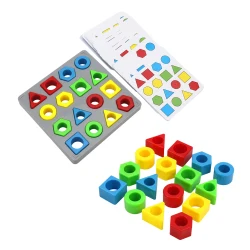Benefits of Learning Games
2024-06-15
Learning games are interactive activities designed to educate and engage players while making the learning process enjoyable. These games leverage elements of play, competition, and problem-solving to reinforce educational concepts and skills. Here are several types and examples of learning games across different subjects and age groups:
1. Mathematics:
- Math Board Games: Games like "Math Bingo," "Math War," or "Mathopoly" (a math version of Monopoly) incorporate arithmetic, logic, and problem-solving skills into gameplay.
- Math Puzzles: Sudoku, KenKen, and Kakuro are puzzles that require mathematical reasoning and number skills to solve.
2. Language Arts:
- Word Games: Scrabble, Boggle, and Bananagrams encourage vocabulary expansion, spelling, and word formation.
- Reading Comprehension Games: Interactive stories or quizzes that test comprehension skills and encourage reading engagement.
3. Science:
- Science Experiments: Virtual or hands-on experiments that teach scientific principles, such as chemistry reactions or physics simulations.
- Nature Exploration: Outdoor scavenger hunts or digital apps that identify plants and animals, promoting environmental awareness.
4. History and Social Studies:
- Historical Role-Playing Games: Simulations that allow players to experience historical events or personas, fostering empathy and understanding of past cultures.
- Geography Quizzes: Map-based games or quizzes that test knowledge of countries, capitals, and geographical features.
5. Critical Thinking and Problem-Solving:
- Logic Games: Chess, Sudoku, or strategic board games like "Settlers of Catan" that require planning, reasoning, and decision-making skills.
- Escape Room Games: Digital or physical escape room challenges that require teamwork and lateral thinking to solve puzzles and complete missions.
6. Coding and Technology:
- Coding Games: Platforms like Scratch or Code.org offer interactive games that teach coding concepts and programming languages in a playful manner.
- STEM Challenges: Engineering and robotics kits or online challenges that teach principles of engineering design and technology.
7. Life Skills and Financial Literacy:
- Financial Management Games: Simulations that teach budgeting, investing, and economic decision-making skills.
- Health and Wellness Games: Apps or board games that promote healthy habits, nutrition knowledge, and mental well-being.
Benefits of Learning Games:
- Engagement: Games capture attention and motivate learning through intrinsic enjoyment and a sense of achievement.
- Retention: Interactive and hands-on activities help reinforce learning concepts and improve retention rates.
- Skill Development: Games foster critical thinking, problem-solving, teamwork, and creativity in a context that is enjoyable and non-threatening.
- Adaptability: Learning games can be tailored to different learning styles and abilities, accommodating diverse learners in educational settings.
Whether used in classrooms, homeschooling environments, or as supplementary learning tools, well-designed learning games can enhance educational outcomes by making learning fun, memorable, and impactful.



